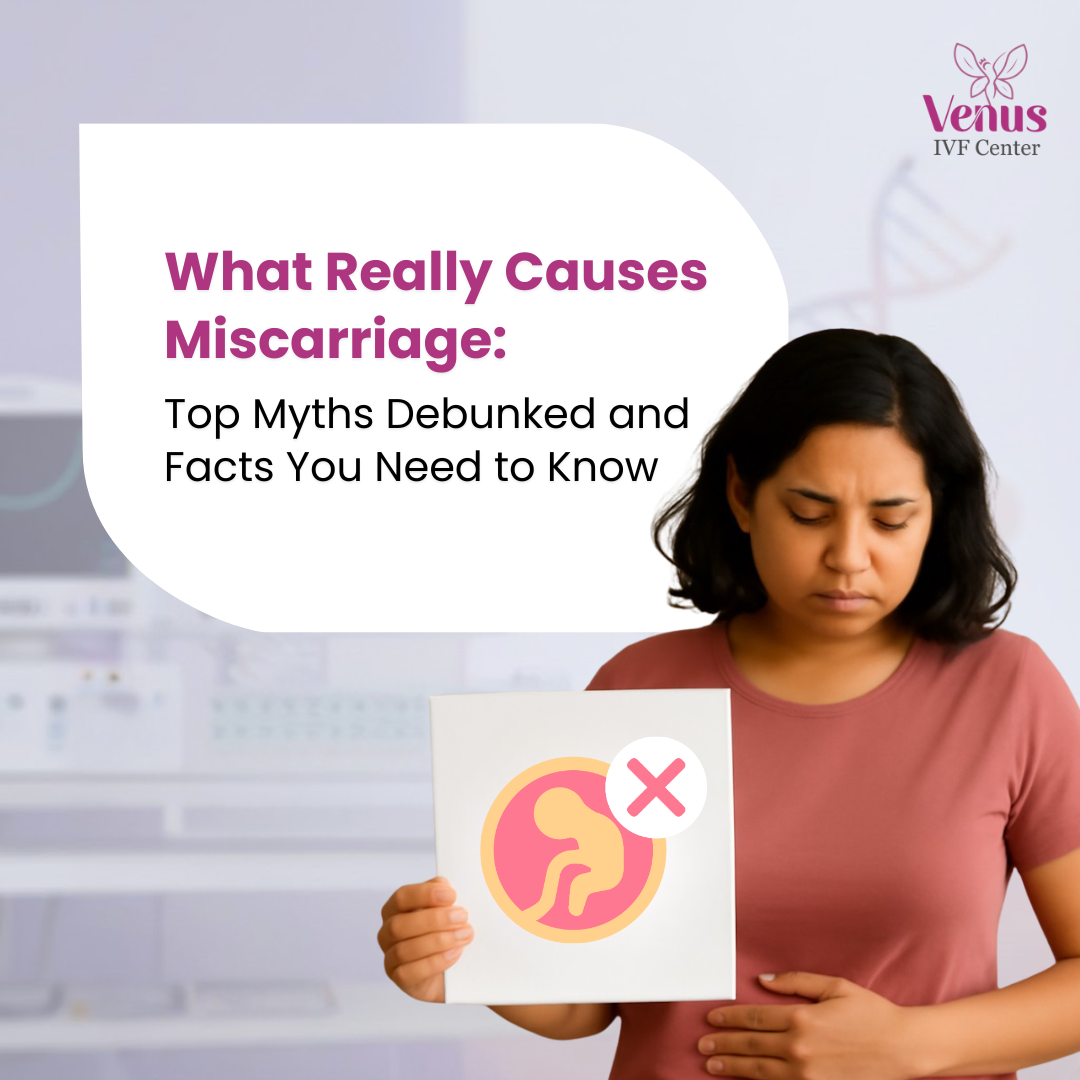

Miscarriage is one of the most difficult experiences a woman can face during pregnancy. It’s a topic that often brings about confusion, sadness, and a lot of questions. For many, miscarriage feels like a mysterious event with no clear understanding of what happened or why. Unfortunately, there are many myths surrounding the causes of miscarriage, making it harder to cope with the reality.
In this blog, we’ll explore the true causes of miscarriage, debunk some common myths, and provide essential pregnancy journey care tips, including the importance of a nutritious diet, mental support, and seeking care from skilled medical professionals, like those at Venus Women’s Hospital.
A miscarriage, also known as a spontaneous abortion, is the loss of a pregnancy before the 20th week. Most miscarriages occur in the first trimester, but they can happen at any point during the pregnancy. A miscarriage can be emotionally and physically overwhelming, leaving women and families searching for answers.
There are many misconceptions when it comes to the causes of miscarriage. Let’s look at some of the most common myths and the facts that explain what really causes miscarriage:
Many people believe that stress, whether from work, relationships, or daily life, can cause a miscarriage. While it is true that stress during pregnancy can affect your health, studies have shown that stress is not a direct cause of miscarriage. Miscarriages are more commonly linked to genetic issues with the baby, which are beyond a mother’s control.
Another common belief is that heavy lifting or physical strain can lead to miscarriage. While it’s important to avoid overexerting yourself during pregnancy, moderate activity and light lifting are generally safe. It is excessive strain or trauma that could potentially cause harm. Always listen to your body and avoid activities that make you feel uncomfortable.
It's common for women to feel guilty after a miscarriage, thinking they did something wrong. The truth is, most miscarriages are caused by chromosomal abnormalities or genetic issues with the fetus. In these cases, it’s often nature’s way of ending a pregnancy that was unlikely to be healthy. Miscarriage is rarely caused by something the mother did.
While certain health conditions like diabetes or hormonal imbalances can increase the risk of miscarriage, the majority of pregnancies are healthy. A woman’s age, the presence of genetic abnormalities, or an intrauterine infection are more likely to be causes. Even women in perfect health can experience a miscarriage.
Miscarriages can happen for a variety of reasons, but most of them are not within a mother’s control. Here are the most common causes:
The leading cause of miscarriage, especially in the early stages, is genetic abnormalities. This happens when the fertilized egg has an incorrect number of chromosomes. This could happen during conception and is not caused by anything the mother did. In fact, about 50% of miscarriages are thought to be caused by genetic issues.
Certain conditions can increase the risk of miscarriage, including:
Hormonal imbalances, such as progesterone deficiency.
Chronic conditions like diabetes, thyroid disease, or autoimmune disorders.
Infections like bacterial vaginosis or sexually transmitted diseases (STDs).
If you have any of these conditions, it’s important to talk to your gynaecologist and get proper treatment or monitoring during pregnancy.
As a woman gets older, her risk of miscarriage increases. Women over the age of 35 have a higher risk of experiencing pregnancy loss due to declining egg quality. The risk is even higher for women over 40.
Physical trauma, such as a car accident or a severe fall, could potentially lead to miscarriage, but these cases are rare. It’s always important to be mindful of safety and avoid risky activities during pregnancy.
Certain conditions related to the shape or structure of the uterus can increase the risk of miscarriage. This could include a septate uterus or fibroids, which may interfere with implantation or fetal development.
While some causes of miscarriage are beyond your control, there are steps you can take to improve your chances of a healthy pregnancy:
Eating a healthy, balanced diet can support both your body and your baby. Nutrient-rich foods like leafy greens, whole grains, lean protein, and healthy fats play a vital role in pregnancy care. Make sure to include foods rich in folic acid (like leafy greens and fortified cereals) and iron (found in beans, spinach, and red meat) to support a healthy pregnancy.
Postpartum mental health plays a critical role in a woman’s overall well-being, but mental support during pregnancy is also essential. Stress and anxiety can affect both mother and baby, so seeking emotional support from friends, family, or a therapist can help. If you’re struggling emotionally, don’t hesitate to talk to a mental health professional.
A skilled gynaecologist in rajkot will provide the proper prenatal care, monitor your health throughout the pregnancy, and offer guidance on lifestyle adjustments. If any complications arise, having a good surgeon who specialises in pregnancy-related issues is vital. Always find a provider who makes you feel comfortable and heard.
Follow your doctor’s advice on things like avoiding certain foods, rest, and managing chronic conditions. Make sure to attend all regular check-ups and ultrasounds to monitor your pregnancy’s progress.
At Venus Women’s Hospital, we understand that the journey doesn’t end with pregnancy. Postpartum care, including support for mental health and physical recovery, is a crucial aspect of overall well-being. Our team is here to guide you through your recovery, ensuring you receive the care and emotional support you need to heal and thrive.
Miscarriage can be a heartbreaking experience, but understanding the facts can help reduce the confusion and emotional burden that often accompany it. At Venus Women’s Hospital in Rajkot, we offer compassionate care, expert advice, and emotional support for women who are navigating the challenges of miscarriage. Remember, it’s important to maintain a healthy lifestyle, seek emotional support, and consult a trusted gynaecologist to ensure the best possible outcome for your health. If you have concerns about your pregnancy, always reach out to a healthcare professional for guidance.